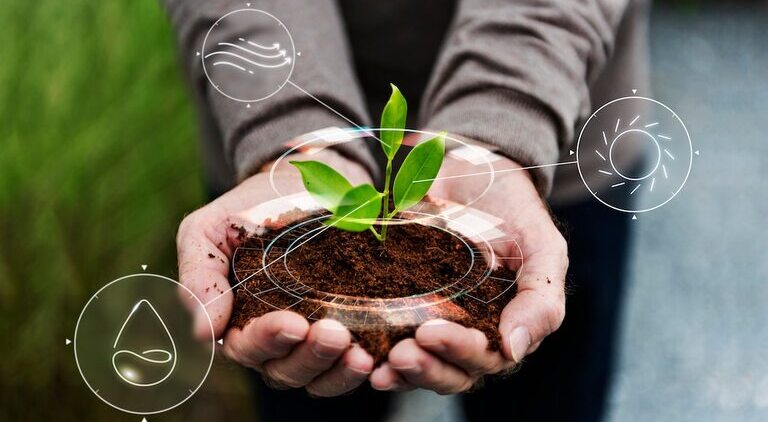
Sustainable Farming guarantees the accessibility of food, the well-being of the environment, and the welfare of society. With the UAE focused on food imports and an arid climate, the more logical course of action would be to pursue more sustainable agriculture. In this blog post, we will analyze sustainable farming in the UAE and its key architectures and frameworks, case studies, advantages, renewable energy possibilities, the importance of local and organic food production, government frameworks, and the role of organizations like NRTC Group catering to this transformation.
What Is Sustainable Farming?
Sustainable farming (or agriculture) involves the responsible and rational use of soil, water, and biodiversity, and maintaining socio-economic balance. In the case of UAE, the sustainability relates to scarce potable water, high temperatures, limited land, and food insecurity. As cited in reports, a number of water conservation irrigation systems, pest bio-management, crop rotation, and other eco-friendly farming techniques are being adopted in a bid to reduce the use of the environment.
Sustainable Farming in the UAE: NRTC Strategies
Unique technologies have emerged and been adopted to enhance more sustainable farming practices across the UAE:
- Hydroponics- Growing plants in nutrient solutions without soil, which uses much less water and allows production in controlled environments.
- Vertical Farming- Plants are grown in stacked layers; ideal to maximize output on limited land, and allows water and energy to be saved while growing year-round.
- Aquaponics- The pairing of fish farming with the growing of plants. Plants gain nourishment through the fish waste and create a closed loop.
- Precision Irrigation and Smart Sensors- The incorporation of drip irrigation, automated systems, and moisture sensors delivers water to a specific area and at a specific time.
Sustainable Farming Examples
The use of hydroponic systems alongside greenhouses dramatically lowers the land and water use of the sophisticated sustainable farming practice.
Vertical farming in peri-urban and urban zone allows the growing of fresh produce proximal to the city.
The practice of aquaponics allows fish and vegetables to be grown on the same farm, optimizing the resources and maximizing the outputs.
The Importance of Sustainable Farming
In UAE and similar arid regions, water and resources are limited and must be preserved. These sustainable farming techniques like precision irrigation and hydroponics preserve resources.
Benefits of Sustainable Farming
Conservation of Water and Natural Resources – Saving Water Is Vital in water-scarce regions such as the UAE. Precision irrigation and hydroponics are excellent methods for achieving this.
Increased Food Self-sufficiency – Increased production for the local market reduces the need for imports.
Natural and Ecological Balance – Reduction in the rate of soil erosion; lesser use of chemicals for pest control; an increase in overall biodiversity.
Economic Sustainability – Lower operational expenses due to significant conservation of water and energy; added opportunity of charging a higher price for organic and local produce.
Community Gains – Increased employment opportunities; enhanced training; improvement in the availability of nutritious food.
Renewable Energy Solutions
In the UAE, several innovations are promising. To achieve full sustainability in agriculture, energy issues must also be addressed.
Solar Energy Systems – Solar energy, especially in hot climates, can be used to power irrigation pumps, greenhouses, and lighting.
Wind Energy Systems – Moderate Windy Coastal Areas can use small to medium Wind Turbines as a complement to solar power.
Bioenergy and Biofuels – The production of biogas or biofuels using agricultural waste or by-products helps to minimize waste and close the cycle.
Encouraging the production of Organic and Local Food
Increasing the number of farmers’ markets so people can buy local organic products directly.
Establishing retail agreements whereby supermarkets and local shops give preference to local, organic products.
Culinary experiences—restaurants, food festivals—cooking with local, organic ingredients, raising consciousness.
Government Actions and Policies Advocating for Sustainability within the UAE
The UAE government has designed and implemented several strategies and policies at the macro level intended to promote the practice of sustainability agriculture.
National policy frameworks such as the National Food Security Strategy and the UAE Green Agenda articulate objectives of reducing dependence on imports, enhancing land-use efficiency, and ensuring sustainability of these functions over the long term.
Micro and regional policy measures: financial subsidies, low-interest loans, and tax incentives for early adopters of innovative technologies for sustainable agriculture and agribusiness practices.
Investments in R&D, education, and training to develop site-specific technologies appropriate to the UAE’s climate (saline soils and high temperatures).
Transforming and Revitalizing Sustainable Agriculture with NRTC Group
The NRTC Group is one of the major players in the agricultural and food supply for the UAE, and as such, has the potential to spearhead the sustainable farming revolution. Below are some of the ways they can do so.
Investments in local hydroponic or vertical farms to grow fresh vegetables and thus reduce imports and the overall carbon footprint.
Collaboration with agri-tech companies to implement smart irrigation, sensors, renewable energy, and biogas systems.
“Providing training and logistical assistance with supportive access to markets while integrating organic and local producers into their supply shack to strengthen their supply chains.
Representing and/or partnering with the government on certain policies and perhaps on the use of certain incentives within the sFS agri-food system to promote integration of sustainable practices on their farms as well as in their supply chains and retail activities.”
Conclusion
Undoubtedly, the most viable form of agriculture that the UAE can practice, given the climatic and physical constraints of the deserts in the country, the limited availability of fresh water, and the over-dependence on imported food, is sustainable farming. Employing and integrating modern farming techniques such as hydroponics, vertical farming, and aquaponics, coupled with the deployment of renewable energy and government initiatives to promote organic farming, is imperative. It is the collective duty of the NRTC Group, policymakers, agri-food system researchers, and farmers to take the lead in transforming the agricultural practices to support the country’s greening efforts.

